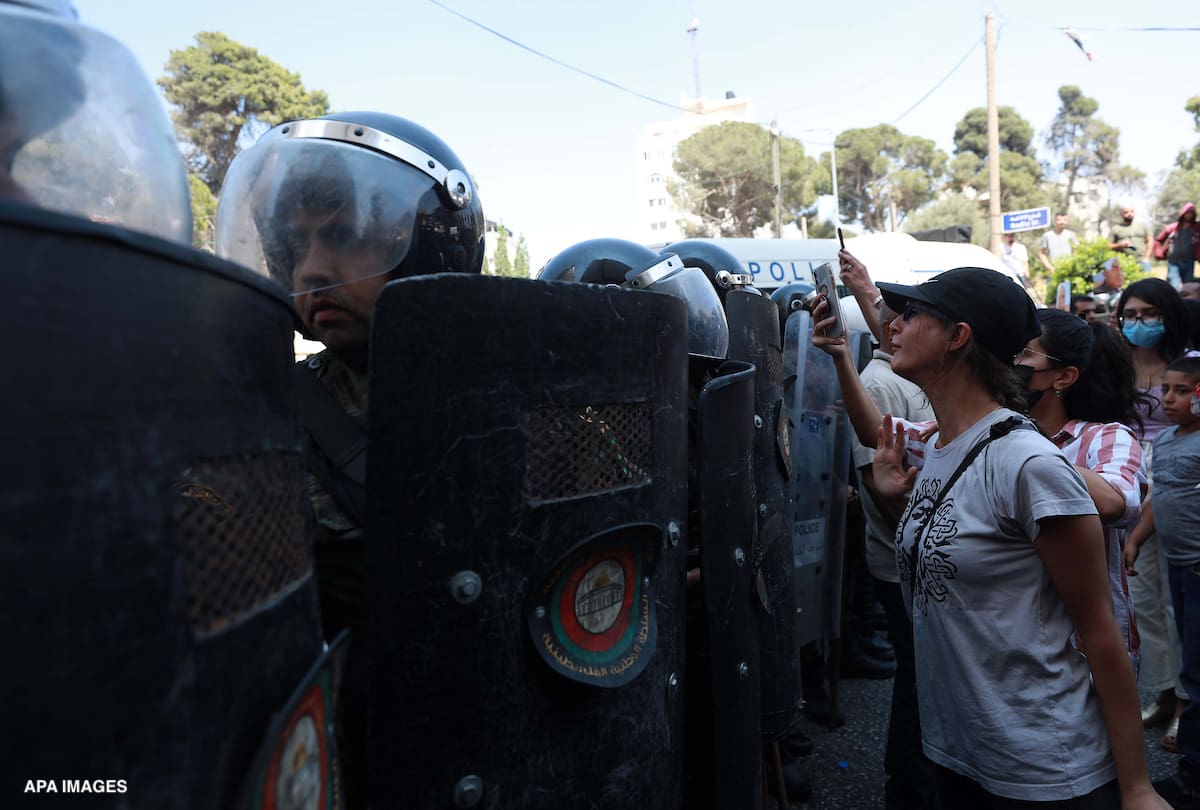
Overview
To date, 2023 is the deadliest year on record for Palestinians in the West Bank since 2005, largely due to the Israeli regime’s violent operations in Jenin and Nablus to suppress Palestinian mobilization and armed resistance. While the Palestinian Authority (PA) was largely absent during the Israeli army’s raids, it quickly sought to re-establish the guise of control following their conclusion. Shortly after Israeli withdrawal from Jenin in July, PA President Mahmoud Abbas visited the city for the first time since 2012, accompanied by a slew of Palestinian security forces. Days later, the PA began a crackdown campaign of its own, arresting members of Islamic Jihad and other factions across Jenin and throughout the West Bank.1
Such a cycle encompasses a critical component of PA-Israeli security coordination: the revolving door/al-bab al-dawaar. This policy memo examines the protocol, situating it within the wider “collaboration paradigm.2” It details what the revolving door looks like in practice, and offers recommendations to both Palestinian leadership and civil society for ways forward that may help to establish accountability, redress, and reconciliation.
What is the Revolving Door?
Security coordination was the defining feature of the Oslo Accords, and continues to be a crucial part of stability, peace, and state-building, according to its proponents. It is widely perceived by these actors as an indication of the PA’s capacity to govern and ensure the preservation of the status quo. Indeed, the PA has itself argued that security coordination “is part and parcel of our liberation strategy.”3
The revolving door policy highlights the shared interests of both the PA and Israeli regime: to suppress and silence Palestinian resistance Share on X
Coordination between the PA and Israeli regime manifests itself in a number of ways. One key element is the revolving door policy. This mechanism is transactional and operational, whereby Palestinian activists, resistance fighters, and members of opposition are imprisoned by either Israeli or Palestinian authorities and then indirectly handed over to the other once released.
For example, the PA may search for, arrest, and imprison an individual for a period of time. Shortly following their release, the individual will then be detained by Israeli authorities, at which time the PA will share the detainee’s security file with Israeli counterparts. The revolving door policy works in reverse as well: once Palestinians are released from Israeli prisons, the PA’s security forces may subsequently detain them.
While independent human rights organizations have long-documented the revolving door policy in practice, PA leadership and members of the security establishment continue to deny its existence. Instead, they accuse any critical voice on this subject of being politically-driven that is motivated by factionalism. Nonetheless, ample evidence exists pointing to the policy’s implementation.
A Case of Shared Interests
Security coordination criminalizes Palestinian resistance, professionalizes Palestinian authoritarianism, and denies the safety of the Palestinian people, while adding further layers of repression to an already highly-oppressive context. Specifically, the revolving door policy highlights the shared interests of both the PA and Israeli regime: to suppress and silence Palestinian resistance.
Importantly, it does so in such a way that preserves the PA’s plausible deniability vis-à-vis locating Palestinian targets on behalf of Israel. By using resources to catch and release Palestinians under the guise of its own security interests, the PA serves as a subcontractor of the Israeli regime while keeping its hands ostensibly clean from such explicit coordination and prisoner transfer.
The revolving door is most often utilized during periods of increased Palestinian organizing and popular resistance. Over the past decade, waves of PA arrests have often followed major Israeli military operations, with campaigns of Israeli arrests occurring shortly thereafter. Since 2022, PA forces have carried out increasing raids across Jenin and Nablus, renewing accusations of the revolving door’s practice, and condemnation of the PA’s continued complicity in the Israeli regime’s settler colonial project.
Recommendations
- The PA should comply with Palestinian popular opinion and halt all security coordination with Israel, including abandonment of the revolving door policy. Doing so would be a critical step in facilitating a process of national reconciliation.
- Palestinian leadership and its security establishment should reject any external intervention or political conditioning of aid that attempts to invest in and sustain security coordination.
- Palestinian civil society and human rights organizations should continue to document the implementation and implications of the revolving door policy as a way to hold the PA and its security establishment accountable to Palestinian Basic Law.
- PA leadership must engage in a constructive and responsible conversation with Palestinian civil society groups about harm caused by security coordination, including the revolving door policy. Accountability is sorely missed in Palestinian governance: a policy dialogue regarding these harms offers an opportunity to redress some of the PA’s wrongdoings that have long hindered the Palestinian people’s struggle for liberation.
- To read this piece in French, please click here. Al-Shabaka is grateful for the efforts by human rights advocates to translate its pieces, but is not responsible for any change in meaning.
- This commonly-used labelling is misleading; as within the reality of settler colonialism and apartheid, coordination and cooperation can be only understood as domination.
- Alaa Tartir, ed., Outsourcing Repression: Israeli-Palestinian Security Coordination (Afro-Middle East Centre, 2019), 3-4.








